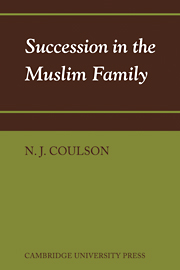Book contents
- Frontmatter
- Contents
- Introduction
- 1 Family ties as grounds of inheritance
- 2 Priorities in inheritance
- 3 Primary heirs
- 4 Substitute heirs
- 5 Secondary heirs
- 6 Grandfather and collaterals in competition
- 7 Succession by the outer family
- 8 Inheritance in Shīʻī law
- 9 Reforms in the traditional system of priorities
- 10 Dual relationships
- 11 Impediments to inheritance
- 12 Conditions of inheritance
- 13 Bequests
- 14 The limits of testamentary power
- 15 Death-sickness
- Index
2 - Priorities in inheritance
Published online by Cambridge University Press: 30 March 2010
- Frontmatter
- Contents
- Introduction
- 1 Family ties as grounds of inheritance
- 2 Priorities in inheritance
- 3 Primary heirs
- 4 Substitute heirs
- 5 Secondary heirs
- 6 Grandfather and collaterals in competition
- 7 Succession by the outer family
- 8 Inheritance in Shīʻī law
- 9 Reforms in the traditional system of priorities
- 10 Dual relationships
- 11 Impediments to inheritance
- 12 Conditions of inheritance
- 13 Bequests
- 14 The limits of testamentary power
- 15 Death-sickness
- Index
Summary
The dual basis of entitlement
The wife of Saʿd b. al-Rabīʿ came to the Prophet with her two daughters and said: “O Prophet, these are the daughters of Saʿd b. al-Rabīʿ. Their father died a martyr's death beside you in battle. But their uncle has taken Saʿdʾs estate and they cannot marry unless they have property.” After this the verse of inheritance was revealed and the Prophet sent for the uncle and said to him: “Give the two daughters of Saʿd two-thirds of the estate, give their mother one-eighth and keep the remainder yourself.”
Sa‘d's case embodies the essence of the changes introduced under Islam into the customary Arabian law of inheritance. In the tribal society of pre-Islamic Arabia the system of inheritance was designed to keep property within the individual tribe and maintain its strength as a righting force. The tribe was patriarchal and patrilineal. Women occupied a subordinate and subjugated position within the group whose bond of allegiance was that of ʿaṣabiyya – descent through male links from a common ancestor. A woman who married into another tribe belonged henceforth, along with her children, to the tribe of the husband. The maternal or uterine relationship, therefore, lay outside the structure of tribal ties and responsibilities. In these circumstances the proper exploitation and preservation of the tribal patrimony meant, inter alia, the exclusion of females and non-agnate relatives from inheritance and the enjoyment of a monopoly of rights of succession by the male agnate relatives, or ʿaṣaba, of the deceased. Hence the initial appropriation of Saʿdʾs estate by his brother, as his nearest male agnate, to the exclusion of the wife and daughters.
- Type
- Chapter
- Information
- Succession in the Muslim Family , pp. 29 - 39Publisher: Cambridge University PressPrint publication year: 1971



